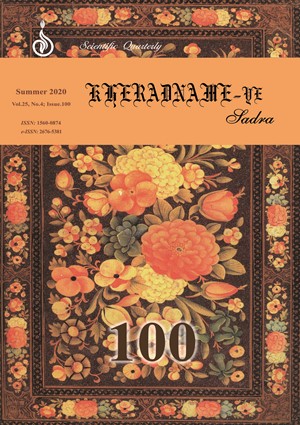-
-
List of Articles
-
Open Access Article
1 - From Wisdom to Functionalism: A New Analysis of the Nature of Mullā Ṣadrā’s Philosophical Paradigm
Hassan Rahbar Hamid Eskandari -
Open Access Article
2 - Place of Act in Man’s Existence in Mullā Ṣadrā
Fateme Soleimani Darrebaghi -
Open Access Article
3 - A Study of Mudarres Zunūzī’s View of the Theory of Interrupting the Divine Punishment based on the Ideas of Ibn ‘Arabī and Mullā Ṣadrā
Hamidreza Khademi Reza Hesari -
Open Access Article
4 - Criteria for Muqarrabūn in Mullā Ṣadrā’s Philosophical Works and Commentaries
Fatemeh Sadeqzadeh Qamsari -
Open Access Article
5 - An Analysis of the “Transcendence of Wisdom” based on Sadrian Self-Knowledge and Methodology
Maryam Sadat Mousavi Mohammad Bidhendi Mohamad Mahdi Meshkati -
Open Access Article
6 - Consistency of Mullā Ṣadrā’s Perception of the Principle of Impossibility of the Knowledge of Effect without the Knowledge of Cause with Ontological Foundations of the Transcendent Philosophy
Seyed Amin Mirhoseini Ali Fathtaheri -
Open Access Article
7 - Editor's note
Seyyed Mohammad Khamenei -
Open Access Article
8 - What is Metaphysics?
Reza Dawari Ardakani -
Open Access Article
9 - Secrets of Sharī‘ah and Benefits of Obedience in Mullā Ṣadrā’s View
Seyyed Mostafa Muhaqqiq Damad -
Open Access Article
10 - Efficient Causality in the View of Islamic Mutikallimun and Philosophers
Seyyed Sadra al-Din Taheri -
Open Access Article
11 - Structure of Logical Propositions in the View of Muslim Philosophers and Logicians
Maqsud Mohammadi -
Open Access Article
12 - An Analysis of the Double-Sided Divisions of Existence based on Sadrian Philosophical System
Abdolal Shokr -
Open Access Article
13 - Philosophy and Art
Seyyed Mohammad Khamenei -
Open Access Article
14 - 100th Issue
-
Open Access Article
15 - Index of papers, published in kheradnaye Sadra
-
Open Access Article
16 - Index of Auathors
-
The rights to this website are owned by the Raimag Press Management System.
Copyright © 2017-2026







